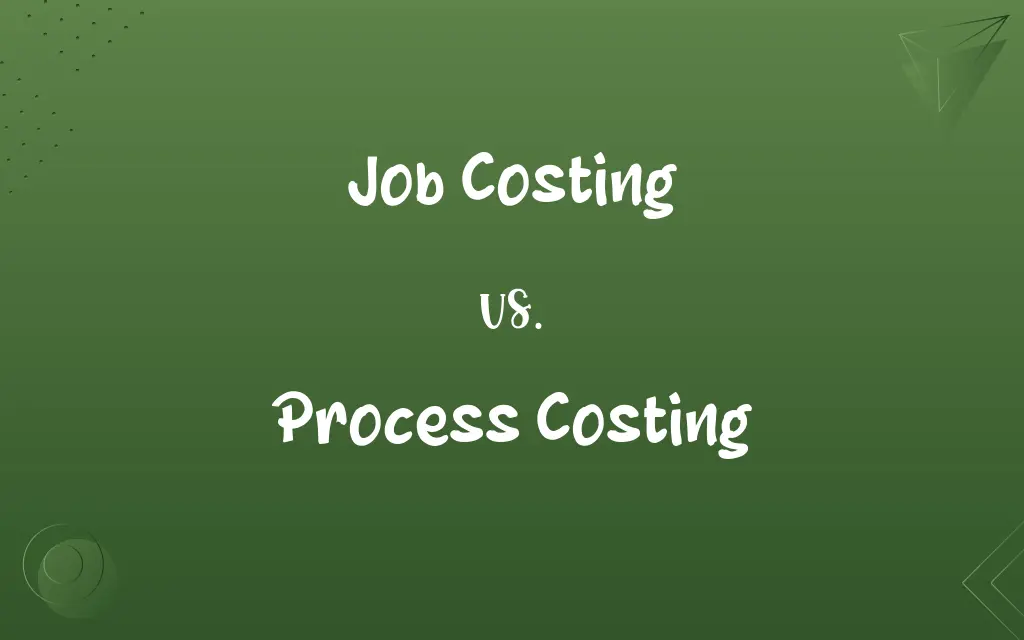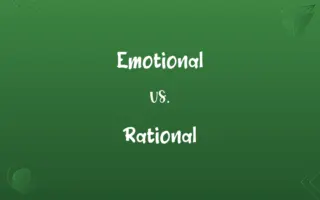Job Costing vs. Process Costing: Know the Difference

By Shumaila Saeed || Published on January 6, 2024
Job Costing assigns costs to individual units or projects, while Process Costing averages costs over continuous production runs.

Key Differences
Job Costing is a method used primarily in custom manufacturing or service industries, where each job is unique and requires individual costing. In contrast, Process Costing is suited for industries where products are homogeneous, and it involves averaging costs over a continuous production process.
Shumaila Saeed
Jan 06, 2024
In Job Costing, costs are tracked for each specific job, allowing for detailed cost analysis of each project. Conversely, Process Costing aggregates costs across multiple units, providing a cost-per-unit figure that reflects the average cost of producing identical or similar products.
Shumaila Saeed
Jan 06, 2024
The cost accumulation in Job Costing is more precise and detailed for each job, making it ideal for custom orders. Process Costing, on the other hand, simplifies cost calculation by spreading it across many units, suitable for mass production scenarios.
Shumaila Saeed
Jan 06, 2024
Job Costing requires meticulous record-keeping for materials, labor, and overhead for each job, facilitating precise cost control. Process Costing, however, involves fewer administrative complexities, focusing on departments or processes rather than individual units.
Shumaila Saeed
Jan 06, 2024
Job Costing is characterized by its flexibility to adapt to different jobs, each with unique specifications. Process Costing is characterized by its efficiency in repetitive, continuous operations where products remain uniform.
Shumaila Saeed
Jan 06, 2024
ADVERTISEMENT
Comparison Chart
Cost Calculation
Per individual unit or project
Over a series of similar products
Shumaila Saeed
Jan 06, 2024
Administrative Complexity
High, due to detailed tracking
Lower, due to simplified tracking
Shumaila Saeed
Jan 06, 2024
ADVERTISEMENT
Job Costing and Process Costing Definitions
Job Costing
Job Costing is used in industries where products or services are tailored to customer specifications.
Job Costing helped the bespoke furniture maker calculate the price for each custom chair.
Shumaila Saeed
Dec 15, 2023
Process Costing
Process Costing simplifies cost calculation for homogeneous goods produced in continuous operations.
Process Costing was used by the food manufacturer to estimate the cost of canned soup production.
Shumaila Saeed
Dec 15, 2023
Job Costing
Job Costing tracks direct and indirect costs for individualized tasks or services.
The design firm applied Job Costing to bill each client based on the specific project needs.
Shumaila Saeed
Dec 15, 2023
Process Costing
Process Costing spreads costs over multiple units, suitable for uniform products.
Process Costing helped the paper mill determine the cost per ream of paper.
Shumaila Saeed
Dec 15, 2023
Job Costing
Job Costing associates costs with specific, non-repetitive activities.
Job Costing was essential for the event planner to budget for each unique wedding.
Shumaila Saeed
Dec 15, 2023
ADVERTISEMENT
Process Costing
Process Costing involves allocating costs to identical or similar products in mass production.
In Process Costing, the cost of manufacturing thousands of identical toys was averaged.
Shumaila Saeed
Dec 15, 2023
Job Costing
Job Costing is the method of calculating costs for each specific job or project.
The construction company used Job Costing to determine the expense of building each custom home.
Shumaila Saeed
Dec 15, 2023
Process Costing
Process Costing is ideal for industries where products are indistinguishable and produced in large quantities.
The chemical company applied Process Costing to track expenses for its standard product line.
Shumaila Saeed
Dec 15, 2023
Job Costing
Job Costing involves assigning costs to distinct projects or jobs based on their unique requirements.
In Job Costing, the cost of materials for a special-order dress was recorded separately.
Shumaila Saeed
Dec 15, 2023
Process Costing
Process Costing is a method of averaging costs across continuous production processes.
The refinery used Process Costing to calculate the cost of producing a barrel of oil.
Shumaila Saeed
Dec 15, 2023
Repeatedly Asked Queries
How does Job Costing handle overhead costs?
In Job Costing, overhead costs are allocated to each job based on predetermined rates or actual costs.
Shumaila Saeed
Jan 06, 2024
What is Process Costing?
Process Costing is a method of averaging costs over a continuous production process, typically used in mass production.
Shumaila Saeed
Jan 06, 2024
Can Job Costing be used for service industries?
Yes, Job Costing is well-suited for service industries where each client project is unique.
Shumaila Saeed
Jan 06, 2024
What industries typically use Job Costing?
Job Costing is commonly used in construction, custom manufacturing, and professional services.
Shumaila Saeed
Jan 06, 2024
Can Job Costing be used for repetitive tasks?
While possible, Job Costing is less efficient for repetitive tasks compared to Process Costing.
Shumaila Saeed
Jan 06, 2024
Is Process Costing applicable to custom products?
Process Costing is generally not suitable for custom products, as it averages costs across similar items.
Shumaila Saeed
Jan 06, 2024
What is Job Costing?
Job Costing is a cost allocation method used for specific, individual projects or jobs, particularly in custom manufacturing.
Shumaila Saeed
Jan 06, 2024
How does Process Costing treat direct labor costs?
In Process Costing, direct labor costs are often averaged across all units produced in a process.
Shumaila Saeed
Jan 06, 2024
What is a major challenge of Job Costing?
A major challenge is the detailed tracking and allocation of costs to specific jobs.
Shumaila Saeed
Jan 06, 2024
How does Process Costing handle cost fluctuations?
Process Costing smooths out cost fluctuations by averaging costs over a large number of units.
Shumaila Saeed
Jan 06, 2024
Which industries are best suited for Process Costing?
Process Costing is ideal for industries like chemicals, textiles, and food processing, where products are homogeneous.
Shumaila Saeed
Jan 06, 2024
Can overhead be tracked in Process Costing?
Yes, overhead costs are allocated to entire processes or departments in Process Costing.
Shumaila Saeed
Jan 06, 2024
Can a company use both Job and Process Costing?
Yes, some companies may use both methods for different parts of their operations.
Shumaila Saeed
Jan 06, 2024
Can Process Costing be used for non-manufacturing industries?
While less common, it can be adapted for industries like utilities or mining.
Shumaila Saeed
Jan 06, 2024
How is waste handled in Job Costing?
In Job Costing, waste is typically allocated to the specific job causing the waste.
Shumaila Saeed
Jan 06, 2024
How does Process Costing treat unique orders?
Unique orders are not typically suited for Process Costing, as it averages costs over standard products.
Shumaila Saeed
Jan 06, 2024
Is Job Costing more accurate than Process Costing?
Job Costing tends to be more accurate for individual projects, while Process Costing is accurate for overall process costs.
Shumaila Saeed
Jan 06, 2024
How do companies choose between Job and Process Costing?
The choice depends on the nature of the production process and the homogeneity of the products.
Shumaila Saeed
Jan 06, 2024
What's a key benefit of Process Costing?
Process Costing simplifies costing in industries with uniform products and large-scale production.
Shumaila Saeed
Jan 06, 2024
What's the impact of technology on Job Costing?
Technology has improved accuracy and efficiency in tracking and allocating costs in Job Costing.
Shumaila Saeed
Jan 06, 2024
Share this page
Link for your blog / website
HTML
Link to share via messenger
About Author
Written by
Shumaila SaeedShumaila Saeed, an expert content creator with 6 years of experience, specializes in distilling complex topics into easily digestible comparisons, shining a light on the nuances that both inform and educate readers with clarity and accuracy.









































































